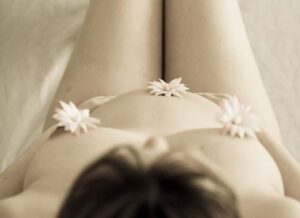Vegan Pregnancy Part Two: Pregnancy and Age Meet a Whole Lot of Evolution

There’s not much that could have prepared me for genetic counseling. The numbers are staggering. The risk factor statistics for pregnancy and age look like a reverse pyramid: at the top, a 15-year old “woman’s” chance of delivering a baby with Down’s syndrome or something worse, comes with a lot of zeros at the end; it’s practically an impossiblity. Towards the very bottom of the pyramid—where I fall in — more glamorously referred to as “late maternal age”—it’s almost a guarantee that something will be wrong with my baby.
One in 39. That’s what the kind, soft-spoken counselor told me my risk factor for having a baby with Down’s syndrome was “at my age.” There are other risks too from more chromosomal abnormalities to neural tube defects and higher risks for miscarriage. And while all the midwife visits, sonograms and blood tests so far have told us “everything looks great”, we won’t really know if she’s healthy until she arrives in September.
As I sat there though in the counselor’s office trying to pass off the chill in the air as just the air-conditioning, I couldn’t help but feel as if those numbers were somehow wrong. Is age measured solely by our birth date, or does our actual state of health factor into our “age?”
I asked the counselor how much diet and lifestyle impact the health of my eggs and my risk factor. “Not at all,” she politely told me. “Eggs just get old, and that puts them at risk for genetic issues; it has nothing to do with your diet.” Still, that didn’t feel right to me. Not to sound superior, but how could my eggs, which have been nurtured on a healthy organic vegan diet for more than two decades, be in the same condition as some exposed to chemical junk food and soda for the same amount of time? I yoga. I hike. I think happy thoughts. That has to account for something, right?
What’s more, it seems as if most of the new moms or moms-to-be I know are in their late 30s or early to mid-40s. They’re healthy themselves, and they’re having gorgeous, healthy babies, too. The 20-somethings I know seem about as likely to have babies these days as they are to get married. Something is clearly shifting in our culture, and age simply ain’t what it used to be. The question that keeps popping into my mind through all of this: Could it be that we’re evolving faster than the scientists can calculate our risk factors?
We know for certain that a 40-year old woman today is far ‘younger’ and healthier than a woman the same age 100 years ago. Our life expectancy wasn’t much past 40 then (it was 55 in 1913). A 40-year-old woman today is hopefully barely at the halfway mark of a long and fulfilling life. And a very healthy 40-year-old? She could live another 60 years. Maybe longer. (My target: 108. 2080 seems like it’ll be quite a good year to ring in…and clock out.)
Extensive Web searches yielded me little more than what the counselor told me: age impacts pregnancy. Period. Halle Berry, who recently conceived at 46, is some kind of Hollywood fertile freak miracle, according to experts. Women in their (early) 40s can have as low as a 5 percent chance of conceiving naturally. If they use fertility methods, their chances may only improve to 20 percent. And then, the miscarriage risk makes the possibility seem even grimmer: for women over 40, it can be as high as 80 percent in the first trimester. That’s just issues with maintaining the pregnancy. It says nothing of the health of the baby.
My mind flashes back to a presentation I saw by health expert Ken Dychtwald. He’s an expert on Baby Boomers and our extending lifespans. He presented a very compelling argument outlining possibilities of how our ‘new’ life expectancy could pan out over the extra decades we’re stockpiling compared with our ancestors. Retirement at 65 may still be ideal, but not so we can sit back and wait to die in a few years; it’s time to go back to school. Travel. Visit family. Embark on a new career.
My grandparents lived to see 80—an age that was for all intents and purposes, out of the question when they were born. With any luck, and a lot of healthy living, I’ll hit my centenarian goal. And if that’s the case, I’m having my first child at the exact perfect time. Who knows, maybe by the time I’m 100 I’ll even be a grandma, too.
Read the first installment of Vegan Pregnancy here.
Keep in touch with Jill on Twitter @jillettinger
Image: Arwen Abendsten

